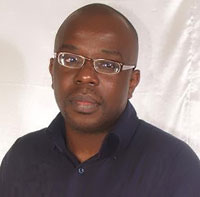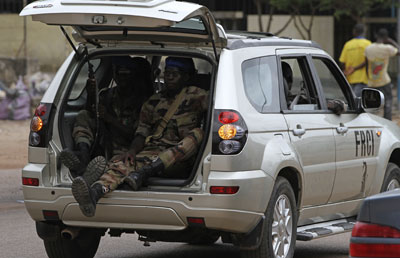This week, former Ivory Coast ruler Laurent Gbagbo was extradited to the Hague to account for alleged human rights violations before the International Criminal Court. Justice appears to be slower in coming to rival fighters loyal to current President Alassane Ouattara. According to CPJ research, Ouattara’s forces have been involved in the deaths of two journalists, most recently Gilles Tutsi Murris Dabé.
Dabé, 39, a presenter with private Radio Nostalgie, was killed by a stray bullet around midnight on November 20, after fighters from the pro-Ouattara Republican Forces of the Ivory Coast (known by the French acronym FRCI) opened fire at a car at a checkpoint near the president’s private residence, according to news reports and local journalists. The fighters opened fire after the driver refused to stop, witnesses told CPJ.

Dabé was better known as “La souris de la route” (The mouse of the road), in reference to the popular educational show on traffic safety he hosted on Radio Nostalgie. Dabé was not on duty when he was killed. According to Radio Nostalgie reporter Yves Douoh, who was standing with Dabé and his wife as they hailed a taxi in the Cocody neighborhood of Abidjan, the journalist was on his way home after taking part in a comedy festival, “Festival du Rire.” Dabé was immediately transferred to a hospital after the shooting, but did not survive his injuries.
Dabé was the second journalist killed by FRCI bullets this year, after Sylvain Gagnetau Lago was executed in May during a security sweep, according to CPJ research. His body was later found in a mass grave. This followed FRCI forces’ ransacking of his station, Radio Yopougon, and their occupation of pro-Gbagbo media outlets. The United Nations has accused FRCI forces of involvement in extrajudicial killings and abuses, according to news reports. In a June 14 report issued to the U.N. Human Rights Council, an international independent commission on Ivory Coast noted that “it had not been informed of effective procedures taken against members of FRCI accused of human rights violations.”
Speaking to CPJ on Wednesday, Ivorian Interior Minister Ahmed Bakayoko, who owns Radio Nostalgie, said progress has been made, and blamed ongoing insecurity on the previous government. “The government has made efforts to collect weapons, but those who were in power [previously] distributed a lot of them,” Bakayoko told CPJ, referencing the Gbagbo government. He dismissed reports of FRCI harassment of journalists favorable to Gbabgo. “You should not just read, you must come to Ivory Coast to see the reality.” He referred our inquiry to the ministry of defense, blaming the shooting that killed Dabé on the military.
Both sides committed abuses against the media during Ivory Coast’s five-month military standoff and struggle for power, according to CPJ research. According to media reports, the government set up in May a military prosecutor to investigate all cases of human rights violations, including those committed by pro-Ouattara forces. In an interview today with CPJ, Ange Kessi, the military prosecutor, said he was not aware of Dabé’s death. Asked if sanctions have been taken against the perpetrators of abuses, Kessi offered a general explanation of the procedure. “There are steps, sanctions taken if the acts are brought to our knowledge. They are arrested, and of course legal proceedings are initiated.” According to him, some two dozen members of the security forces, including policemen and FRCI fighters, are in custody. “I currently am in charge of roughly 20 cases, 25 militaries have been arrested,” he said. “The trial will start before December 11, 2011.”
